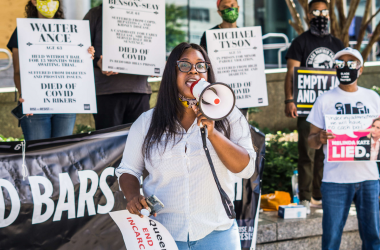by Victoria Law
Originally published on Bitch Magazine
July 23rd, 2015
“The justice system is not something we can view in isolation. It is an extension and reflection of some broader decisions we’re making as a society.”
That was what President Barack Obama said as he addressed the NAACP at its annual convention last Tuesday. That same week, two separate Black women, in two separate states, were arrested and later found dead in their cells. The deaths of Sandra Bland and Kindra Chapman are stark illustrations of some of these decisions made by the justice system—and broader society.
28-year-old Sandra Bland was driving from Chicago to start a new job at her alma mater, Prairie View A&M University, when she was pulled over by Texas state trooper Brian Encinia for an failing to signal during a lane change. Instead of issuing her a warning or a ticket, when Bland refused to put out her cigarette, Encinia ordered her out of the car, threatening, “I’m going to drag you out of here” and reaching into her car. That was not his only threat. He also yelled, “I will light you up!”
Video from a bystander and from Encinia’s dashboard camera shows the officer holding Bland down on the ground as she shouted, “You just slammed my head into the ground. Do you not even care about that? I can’t even hear!” Bland also asked Encinia fourteen times why she was being arrested. He never tells her the reason.
Sandra Bland was held in the Waller County jail for three days. She called her sister about the $500 bond needed for her release. But the morning of July 13, she was found dead in her cell, hanging by a plastic trash bag. The medical examiner’s report and the county sheriff’s office ruled her death a suicide, but family members have disputed that claim and they, along with local activists, are demanding an independent investigation. The District Attorney’s office says they are now investigating the suspicious death “like a murder.”
In the aftermath of last summer’s police killings, there have been calls for police to wear body cameras. Advocates have argued that body cameras, and the knowledge that their moves are being record, would deter police from brutality and violence. But the cop that pulled Sandra Bland over had a dashboard camera. He knew that his actions were being recorded and that didn’t prevent him from threatening her and slamming her to the ground. The dashcam footage was released soon after her death and after the bystander’s video had already been posted publicly. However, many people (including Selma filmmaker Ava DuVernay) have noted that, despite claims to the contrary by the Texas Department of Public Safety, the video has obviously been edited. The jail where Bland was held also had surveillance cameras. But those cameras did not keep her safe—or alive. The footage released by the jail did not show the inside of her cell and has gaps in its time sequence, which the county’s district attorney attributed to the video being motion-activated. “There’s going to be some gaps,” he said at a news conference.
But Bland’s death is not a one-time tragedy. She is also not the last Black woman to be found dead in her jail cell. The next evening, staff at the jail in Homewood, Alabama, found 18-year-old Kindra Chapman “unresponsive” less than two hours after she had been booked. Authorities said that she had used a bed sheet to hang herself. But Chapman’s mother, Kathy Brady, says that the police did not notify her of her daughter’s death until 9 pm, more than one hour after she was found. Like the family of Sandra Bland, she does not believe that her daughter committed suicide, telling news site ALcom that she believed police had killed her daughter.
Bland’s arrest illustrates the ongoing threat of Driving While Black, in which Black drivers are more likely than white drivers to be pulled over, ticketed and/or arrested for minor traffic violations. Legal analysts have been interviewed about the legality of her arrest. While Chapman’s death garnered some protests—and arrests—from #BlackLivesMatters protests, hers has garnered far less media attention, perhaps because Chapman, charged with first-degree robbery and with a history with the police and legal system, makes a less compelling victim. But regardless of the charge, or her history with the legal system, Chapman was an 18-year-old who should not have had her life cut short in a jail cell.
Similarly, Bland, who was starting a new chapter in her life with a new job, should not have been threatened, assaulted, and arrested because she failed to signal during a lane change and refused to put out her cigarette. She should not have spent three days in jail because she could not afford the $500 bond needed for her release.
The deaths of Sandra Bland, Kindra Chapman and so many others illustrate just what the justice system, reflecting the beliefs of our larger society, think of Black women: That their lives don’t matter.
Related Reading: Will Filming the Police Keep Us Safe?
Victoria Law is a voracious reader and freelance writer who frequently writes about gender, incarceration and resistance. She is also the author of Resistance Behind Bars: The Struggles of Incarcerated Women.
Buy Resistance Behind Bars:
Buy Don’t Leave Your Friends Behind:




